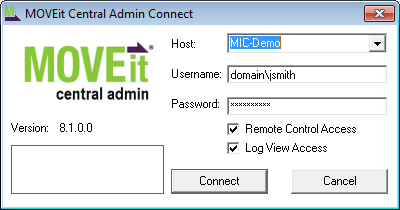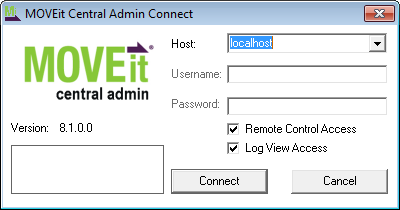In order to configure hosts and tasks, and to view logs and status events, MOVEit Automation Admin must first be connected to a running MOVEit Automation server. When MOVEit Automation Admin is started, the connection dialog box appears.

This dialog allows the operator to select a MOVEit Automation by hostname or IP address, enter a username and password and connect/authenticate to that MOVEit Automation.
When MOVEit Automation Admin connects remotely, MOVEit Automation will allow access only if:
The type of access allowed by MOVEit Automation depends on the user's group membership. The "Remote Control" and "Log View" checkboxes will display or hide all configuration and monitoring functions, respectively. (Only check the "Log View" box if you are signing on to the secondary node of a MOVEit Automation Failover cluster.)
NOTE:A user using MOVEit Automation Admin to connect to a MOVEit Automation server on the same machine (localhost) does not currently need to provide a username/password.
The proper syntax to use when signing on to MOVEit Automation with a domain account is "[DOMAIN]\[username]", even if you regularly use syntax such as "[username]@[DOMAIN]".
Service Control
MOVEit Automation Admin can provide basic service control when running on the same system as the MOVEit Automation service. Central Admin will present a Start Service button, which will start the MOVEit Automation service on the local system, assuming the following requirements are met:
Once the service is running, the usual Connect button will be available. Service status will be displayed in the status window.

Minimum Version
MOVEit Automation requires that the version of MOVEit Automation Admin be fairly recent. Each release of MOVEit Automation requires a specific minimum version. If the version of MOVEit Automation Admin is too old, MOVEit Automation will reject the connection attempt with an error message. You can override the minimum version required by MOVEit Automation on the server side; see System Internals.